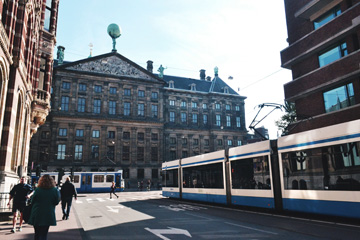
Our Dutch lawyers in the Netherlands represent a large number of foreign clients in legal disputes before Dutch courts. As the Dutch court system differs in important aspects from the court system in the United Kingdom or the USA, our Dutch lawyers have prepared an overview of the Dutch court system. The overview addresses the most important aspects and answers the most relevant questions about litigation in the Netherlands. Our team of lawyers at our Amsterdam office is admitted to all courts in the Netherlands. Our litigation attorney in the Netherlands is at your disposal for further questions and we would be more than glad to advise you on litigation in the Netherlands or to represent you before a Dutch court.
Civil litigation in the Netherlands
Regarding civil litigation in the Netherlands and filing a claim in the Netherlands, civil cases can be heard in three instances:
In the Dutch court system, subdistrict courts, district courts, and Courts of Appeal decide on the facts and circumstances, while the Supreme Court (Hoge Raad) reviews judgments on points of law.
The Netherlands has ten district courts. The district courts have general jurisdiction for all civil cases. Each district court has a division that is competent for all civil claims with an amount in dispute of up to EUR 25,000, as well as for civil cases relating to employment contracts, agency agreements, lease agreements and hire-purchase agreements. These divisions are referred to as subdistrict courts (kantongerechten) and civil cases are decided by one single judge (the kantonrechter). At subdistrict courts, representation by a Dutch lawyer is not mandatory. However, it is absolutely recommended to consult a lawyer before initiating such proceedings to obtain expert advice on the case in question.
All other civil litigation matters in Holland, including all commercial claims with an amount in dispute above EUR 25,000, are heard by the civil division of a district court (rechtbank) and a litigation attorney in the Netherlands is required. In the Dutch district courts, court cases are heard by a single judge or a panel of three judges, depending on the complexity of the case and on what the district court considers adequate. In cases before the district court, representation by a Dutch litigation attorney in the Netherlands is mandatory.
In the Netherlands, civil cases can be heard in three instances. Subdistrict courts, district courts, and Courts of Appeal decide on the facts and circumstances, while – in last instance – the Supreme Court (Hoge Raad) reviews judgments only on points of law.
Dutch law provides that the losing party pays the costs of the Dutch procedure including the legal costs of the winning party. In this respect it must be noted that the costs of procedure are not the actual expenses made; the amount of the procedural costs to be paid consists of lump sums, which are determined by the court in the judgment. Under Dutch law, there is no separate procedure for determining the costs of procedure and there is no law on the remuneration of a litigation attorney in the Netherlands.
Under Dutch law, a judgment must first be directly served by the bailiff before the international judgment can be enforced. A party can request that a judgment be provisionally enforced before it becomes final.
If the losing party at first instance brings an appeal against the first-instance judgment which is not provisionally enforceable, the enforceability shall be stayed pending the outcome of the appeal.
Statistically, about 70% of all civil proceedings in the Netherlands are decided at first instance in less than 12 months, and approximately 90% are decided within 24 months.
.
Commercial litigation in the Netherlands
Commercial litigation in the Netherlands begins at the court level. There are eleven courts throughout the country, located in major cities like Amsterdam, Rotterdam, and The Hague, as well as in regions like Gelderland, Limburg, Midden-Nederland, Noord-Holland, Oost-Brabant, Overijssel, and Zeeland-West-Brabant. In civil matters, the subdistrict court (kantonrechter) deals with cases involving up to €25,000, as well as employment, rent, consumer purchases, and consumer credit disputes. Anyone dissatisfied with a decision made by either a court or a subdistrict court can appeal. For civil (subdistrict) court rulings, appeals must be filed within three months after the judgment. There are four courts of appeal in the Netherlands: Amsterdam, Arnhem-Leeuwarden, The Hague, and ‘s-Hertogenbosch.
Litigation attorney in the netherlands
Hearings on issues of interim relief require an urgency to decide upon the contentious issues and can take place at truly short notice – even within one day if the urgent character of the case requires so. Our litigation attorney in the Netherlands has the experience that you require. Examples of proceedings in which there may be a high degree of urgency are:
- proceedings on disputes on the transfer of shares in a company which, when executed, disadvantages a party, or
- cases in which the retransfer after ordinary proceedings is virtually impossible or difficult,
- cases concerning the transfer of parts of assets which, for example, disadvantages a creditor.
Interim relief proceedings in the Netherlands
A distinctive feature of the Dutch court system in civil matters, is the specific chamber of each district court for interim relief proceedings in the Netherlands (kort geding). These chambers are staffed by one single experienced judge. Hearings on issues of interim relief require an urgency to decide upon the contentious issues and can take place at truly short notice – even within one day if the urgent character of the case requires so. Examples of proceedings under Dutch procedural law in which there may be a high degree of urgency are:
- proceedings on disputes on the transfer of shares in a company which, when executed, disadvantages a party, or
- cases in which the retransfer after ordinary proceedings is virtually impossible or difficult,
- cases concerning the transfer of parts of assets which, for example, disadvantages a creditor.
In interim relief, the judge in the Netherlands delivers a substantive ruling within two weeks or, if necessary, as soon as possible. A Dutch judge in such proceedings can in principle only order interim relief; they may not conclusively assess the legal relationship of the parties. However, claims for the performance of a contract or the omission of a certain act may be awarded. Since a judgment in interim relief is an enforceable title under Dutch law, proceedings for interim relief are often highly effective. Frequently, the parties accept the court’s order without any main proceedings before the ordinary chamber.
Civil appeal proceedings in the Netherlands
Apart from civil claims (relating to legal disputes in the Netherlands) with an amount in dispute of less than EUR 1,750, judgments of a district court or a subdistrict court can be appealed to a Court of Appeal (gerechtshof). In the Netherlands, there are four courts of appeal. Proceedings before a Court of Appeal are normally heard by three judges. Our Dutch lawyers in the Netherlands have quite a lot of experience with an appeal procedure in the Netherlands and a litigation attorney in the Netherlands is required for these type of cases.
Supreme court of the Netherlands
The Supreme Court of the Netherlands (Hoge Raad) is located in The Hague. It reviews decisions of lower courts, but only regarding the legal issues. In doing so, the Supreme Court in the Netherlands is bound by the facts and circumstances established by the lower courts. At the discretion of the Supreme Court, cases are heard by three or five justices. Decisions are taken by the appointed justices, but only after deliberation in a plenary session with all the Supreme Court justices.
Specialized courts and chambers in the Dutch court system
In relation to litigation in the Netherlands, it is good to know that there are several specialized courts and chambers in the Netherlands. The best-known is the Enterprise Chamber at the Court of Appeal in Amsterdam, which deals specifically with disputes within companies (the Ondernemingskamer). Cases for the Enterprise Chamber concern for example disputes between shareholders, disputes about management, corporate governance issues, as well as disputes about the financial management of the company. The Enterprise Chamber hears all cases with three professional judges and two lay judges who are specialists in the field of finance, auditing or the management/executive board. In addition, the Enterprise Chamber may order an experienced auditor (often a business lawyer or former managing director) to examine the company’s operations and issue an opinion. During the litigation before the Enterprise Chamber, a company’s board of directors can remove directors or appoint interim directors to manage the company during the court proceedings. A litigation attorney in the Netherlands is required for these type of civil proceedings in the Netherlands.
Netherlands commercial court (ncc) for litigation in English
On 1 January 2019, a special court for commercial matters was established: the Netherlands Commercial Court (NCC) for litigation in English. The NCC consists of a specialized chamber within the Amsterdam District Court and, in the case of appeal proceedings, the Amsterdam Court of Appeal. Proceedings before the NCC are conducted in English and decisions or judgments are rendered in English. The rules of private international law apply in relation to the NNC’s jurisdiction, which is linked to the jurisdiction of the Amsterdam District Court or the Amsterdam Appeal Court. Moreover, the NCC has jurisdiction over disputes in the Netherlands only on a voluntary basis, so the parties must agree to have a dispute adjudicated by the NCC. The NCC’s jurisdiction can also be established by contract between the parties involved. Hence, a substantive connection between the dispute and the Netherlands or the jurisdiction of the Dutch courts is not required. A litigation attorney in the Netherlands is required for these type of civil proceedings in the Netherlands.
Collective actions under Dutch law
On 1 January 2020 a new act on collective redress entered into force: the Collective Damages Act (Wet Afwikkeling Massaschade in Collectieve Actie: WAMCA), which makes it possible to claim damages collective actions under Dutch law. Prior to the new act, collective actions could be employed exclusively to obtain a declaratory judgment holding the unlawfulness of an action. Such a declaratory judgment could subsequently be used by the individuals to file a claim for damages in separate cases. Although the collective action procedures in the Netherlands were already well developed, the new act certainly enhances the position of injured parties in collective action. Our Dutch lawyers would be more than glad to advise you on this matter.
In relation to settlement procedures in collective actions, the following must be noted. Parties to a collective action may decide to settle a case under Dutch law. The Amsterdam Court of Appeal has exclusive jurisdiction to review such settlement agreements and to declare them to be generally binding. Such a generally binding settlement is recognized across the Member States of the European Union on the basis of the applicable EU law. A litigation attorney in the Netherlands is required for these type of civil proceedings in the Netherlands.
Judges in the Dutch court system the role of judges in Dutch civil proceedings
To ensure independence of the judiciary, in the Netherlands professional judges are appointed as lifetime civil servants. A basic principle of the Dutch Code of Civil Procedure is that judges adopt a passive attitude in court proceedings, especially regarding fact-finding and defining the boundaries of the dispute and the legal debate. These issues typically fall within the scope of party autonomy, which originally is a guiding principle in Dutch litigation. However, nowadays there is a tendency towards a more active role for judges. This is reflected, amongst other things, in recent legislative initiatives that accommodate judges with more competences with respect to the taking of evidence, working towards settlement or mediation, as well as in the handling of court proceedings.
Limitation periods under Dutch law
Although in the Netherlands certain civil claims become time-barred after at latest 20 years, most civil claims become time-barred already after five years. The moment on which limitation periods under Dutch law start, depends on the nature of the particular claim. For example, a claim for performance of a contract, in particular payment, must be brought within five years after the performance is due. Also, a claim for damages must be asserted within five years after the aggrieved party has become aware of both the damage suffered and of the person liable for causing it. Lastly, a claim for rescission (ontbinding) of the contract due to non-performance must also be asserted within five years after the creditor has become aware of the non-performance.
Suspension of a limitation period under Dutch law
Under Dutch law, a limitation period can be suspended by a written notice reserving the right to pursue the claim or by initiating court proceedings. A reminder to perform that meets the specific requirements for suspension suffices for the suspension of the limitation period. After the suspension of the limitation period, in principle the same limitation period starts again. In principle, Dutch law allows repeated suspension of a limitation period. In relation to litigation in the Netherlands, it is crucial to note that the expiration of a limitation period is a defence that must be brought by the defendant; Dutch courts cannot address or examine the issue of limitation periods on their own motion.
Conduct of the parties prior to bringing an action in The Netherlands
From a strategic point of view, in some situations it is worth considering conducting a witness examination or calling in an expert witness before initiating court proceedings to clarify and strengthen the evidentiary position in advance. These witness statements or the expert opinion can be used in the later court proceedings. Under certain circumstances, court proceedings can also be avoided if a party realizes that its own (evidentiary) position is difficult or that a settlement should be sought.
Dutch law does not provide for an obligatory disclosure of available records, documents, evidence et cetera to the other party prior to litigation. Nevertheless, Dutch law does provide for a specific procedure in which, for example, inspection of documents held by the other party can be requested.
Pre-judgment attachment under Dutch law
Enforcement of a judgment after the conclusion of the legal proceedings bears a risk in relation to the availability of the losing party’s assets. Therefore, Dutch law provide for the option of pre-judgment attachment of such assets (conservatoir beslag), to ensure that a court decision can be enforced after the conclusion of the court proceedings. Such a pre-judgment attachment under Dutch law must be requested before the competent court. After the court order has been issued, the assets of the other party, such as bank deposits, real estate, vehicles, and so on and so forth can be attached. As a rule, the other party’s access to the attached assets is blocked until the conclusion of the court proceedings, so that a judgment can be enforced accordingly. Also, in certain cases, documents or other evidence may be subject to attachment in order to preserve evidence. An order for attachment under Dutch law is obtained ex parte: the competent Dutch court usually issues the order authorising the attachment shortly after the relevant application has been filed. The judge examines the application to determine whether the alleged claim is plausible and whether the necessary formalities under Dutch law have been fulfilled. After the order has been issued or the provisional attachment has been executed, the other party whose assets have been attached can, in proceedings for interim relief, request that the attachment be lifted. Under Dutch law, the same court that issued the order approving the attachment has jurisdiction in such proceedings for interim relief. Because of the far-reaching consequences of such an attachment, the court will schedule a hearing as soon as possible. In such revocation proceedings, however, the judge will examine only whether the attaching party’s claim is plausible. A full review or assessment of the substance of the claim will only take place in the main proceedings. In this respect it must be noted that under Dutch law an attaching party is liable for the damages suffered by the defendant if their claim is rejected in the main proceedings. A litigation attorney in the Netherlands is required for these type of civil proceedings in the Netherlands.
Initiation of civil proceedings in The Netherlands
This article addressed the question how civil proceedings are initiated in the Netherlands, as well as how and when the parties to the proceedings are informed of the initiation of the proceedings. In addition, attention is paid to important aspects of civil proceedings in the Netherlands, such as the burden on courts.
According to Dutch procedural law, a claim must be commenced with the service of the writ of summons (dagvaarding) by a bailiff upon the defendant. A Dutch civil procedure is considered pending after this service. However, because of the fact that with the service of the writ of summons no court is involved yet, no court costs are due at this point in time. The date on which the proceedings are brought before the court is recorded in the writ of summons. Depending on the tactics and interests of the plaintiff, there can be a certain period of time between the service of the writ and the start of the proceedings before the court, which allows parties to negotiate a settlement by which litigation can still be avoided.
Under Dutch law, the writ of summons must contain the plaintiff’s claim and the grounds or basis for the claim. In addition, the plaintiff must include the arguments already known to it in defence of the defendant and present all relevant facts and available evidence so that the court is fully informed.
It must be noted that certain civil matters must be initiated by making an application (or: a petition) (verzoekschrift) to the court, instead of a writ of summons. The substantive structure of such an application is essentially the same as that of a writ of summons. After the application has been filed, the court informs the parties involved about the application and sets a time limit within which the defendants must respond to the application.
BURDEN ON THE COURTS IN THE NETHERLANDS
The workload of Dutch courts is significant and problematic. This is reflected in the length of court proceedings. Often, it takes a long time before a date is set for an oral hearing or for a judgment to be handed down in the Netherlands. Unlike other legal systems, however, the delay is months, not years.
Except for proceedings before the Supreme Court, civil proceedings in the Netherlands are not yet digitized. While there are plans to do so, it is not yet clear whether and how these plans will be implemented.
PROCEDURE AND DURATION OF A DUTCH COURT CASE
Below, the specialized litigation attorneys in the Netherlands of MAAK Advocaten in the Netherlands explain the procedure and duration of Dutch civil proceedings.
Dutch civil proceedings start with the plaintiff’s writ of summons (dagvaarding), to which the defendant may respond with a written statement of defence (conclusie van antwoord). Due to the time limits and their possible extensions stipulated in the Dutch Code of Civil Procedure, this first phase – i.e. from the service of the writ of summons to the delivery of the statement of defence – usually takes three to six months. Dutch procedural law provides for various objections in ancillary matters, such as the objection to the jurisdiction of the court. An incidental matter can prolong the duration of proceedings.
After a writ of summons and a written statement of defence have been filed, the court will usually schedule an oral hearing during which the parties can explain their positions and the judge can ask questions. In addition, during an oral hearing also the continuation of the proceedings, and the possibility of a settlement are addressed. After an oral hearing, the court will either deliver a judgment or order the parties to explain their positions in more detail or to submit further evidence to the court. Further evidence can be submitted for example by introducing witness evidence or an expert opinion.
Regulatory litigation in the Netherlands
MAAK Attorneys specializes in regulatory litigation in the Netherlands, addressing legal matters involving government agencies, regulations, and regulated industries. Our expertise includes challenging agency rulemaking and regulatory actions, handling enforcement actions against regulated entities, and resolving compliance disputes. We also engage in discussions with supervising authorities such as the NVWA (Dutch Food and Consumer Product Safety Authority) and ILT (Human Environment and Transport Inspectorate) to facilitate effective communication and negotiation. Additionally, we tackle constitutional challenges to regulatory frameworks and litigation aimed at prompting agency action.
DURATION OF CIVIL PROCEEDINGS IN THE NETHERLANDS AT FIRST INSTANCE
Statistically, about 70% of all civil proceedings in the Netherlands are decided at first instance in less than 12 months, and approximately 90% are decided within 24 months.
DURATION OF CIVIL PROCEEDINGS IN THE NETHERLANDS AT SECOND INSTANCE / APPEAL
It is interesting to note that in the Netherlands, statistically, 10 to 15 % of all first instance judgments in civil cases are appealed. Less than 50 % of the appeal cases are decided within 12 months. Approximately 80 % of all appeals are concluded within 24 months. Cases before the Dutch Supreme Court take an average of 24 months.
AMSTERDAM DISTRICT COURT – PILOT OF A FASTER CIVIL PROCEDURE
The Amsterdam District Court is running a pilot of a faster procedure in simple cases where the examination of witnesses or expert evidence is not necessary. The procedure is similar to a procedure in interim relief, however it leads to a final decision. In these cases, the oral hearing usually takes place within six to ten weeks after the start of the proceedings. However, it should be noted that such a fast procedure is only possible if both parties agree or consent to it.
DUTCH COURT PROCEDURE – CONTROL BY PARTIES
A question that is often asked to our litigation attorney in the Netherlands is to what extent the parties in Dutch civil proceedings can control or influence the course of proceedings or their time schedule.
The answer is that to a certain extent and only in exceptional cases, parties can control the timing of Dutch court proceedings, provided that they agree to deviate from the set deadlines or the normal course of such proceedings. The experience of our Dutch lawyers is that especially in complex procedures it can be a good option to deviate from the ordinary time limits after consultation with the court.
As a rule, a party is given a period of four or six weeks to file a pleading with the court. In Dutch court proceedings at a district court, a first extension is granted only with the consent of the opposing party. A second extension requires good cause or force majeure – therefore, such a second extension is exceptional.
DUTCH EVIDENCE law – DOCUMENTS IN DUTCH civil PROCEEDINGS
Below, our specialized Dutch lawyers explain the questions of how Dutch evidence law is structured, whether there is a duty to preserve documents and other evidence until the trial, and whether the parties are obligated to exchange relevant documents or to make such documents available to the opposing party.
In Dutch court proceedings, parties are generally obligated to truthfully submit to the court all relevant facts and evidence explaining and proving their positions, as well as disproving the positions of the opposing party. However, it should be noted that this obligation differs from disclosure obligations that exist in common law jurisdictions. As a main principle, Dutch procedural law requires that the party taking certain positions must also prove them. There are, however, exceptions and nuances to this main rule. Our specialized litigation attorney in the Netherlands is more than happy to inform you about those exceptions and nuances.
Either the request of a party or on their own motion (ex officio), the court may order a party to submit (further) documents or evidence in the possession of that party. The party confronted with such an order may refuse to submit such documents or evidence to the court for compelling reasons. However, the hurdle to successfully refuse to comply with such an order is rather high and it is not easy for a reason to qualify as ‘compelling’.
Under Dutch law there is no general obligation to retain documents or other evidence until the hearing. The production of evidence remains the responsibility of each separate party. A demand for general disclosure by the opposing party is not possible under Dutch law. An exception to this rule is Article 843a of the Code of Civil Procedure, which allows a party to request access to specific documents. However, the exception is subject to a number of conditions, about which our specialized lawyers can inform you. Further, for a request for inspection, certain evidence or documents can also be seized provisionally. A party can apply to the court for such an attachment. After approval, a Dutch bailiff will seize and retain the relevant documents until the court has ruled on the request for inspection by the seizing party.
In the Netherlands, the term “contempt of court” does not exist, but the court may draw conclusions that are detrimental to the party who fails to comply with the obligation to provide relevant facts fully and truthfully, or in the event of destruction of evidence or withholding of evidence.
According to the Dutch Supreme Court, evidence, documents, and records in English, French and German may be presented as evidence to the court without translation. Nevertheless, the court may order a translation.
EVIDENCE UNDER DUTCH LAW – RELATIONSHIP OF TRUST AND ATTORNEY-CLIENT PRIVILEGE
In Dutch court proceedings involving a foreign party, the question is often raised whether certain documents are protected against access by the opposing party, or whether an obligation to disclose them can be imposed.
Under Dutch law, due to the relationship of trust and attorney-client privilege, a lawyer cannot be compelled to disclose information or documents received from his client, unless it concerns advice of an in-house lawyer. The protection of documents in Dutch civil procedure is therefore not linked to specific documents, but to the capacity of the lawyer – that is: whether the lawyer is an external attorney at law or an in-house lawyer. The party itself may invoke the confidentiality of the advice as one of the compelling reasons preventing disclosure after an order by the court. Note that correspondence between Dutch lawyers which was not a part of settlement negotiations or which falls within the scope of a confidentiality agreement can be introduced as evidence in Dutch civil proceedings.
EVIDENCE IN dutch CIVIL PROCEDURE
In what follows, our specialized litigation lawyers explain how evidence is produced in Dutch civil procedure and whether witnesses and experts can give oral evidence.
In Dutch civil procedure the focus lays on written submissions / pleadings. The parties must produce the available and relevant evidence in their first possible pleading – that is, the writ of summons or the written statement of defence. Often, judges decide primarily on the basis on these documents and the evidence attached to them.
EXPERT OPINIONS IN dutch civil procedure
In Dutch civil procedure, written expert opinions may be used in evidence. In principle, each party may submit an expert opinion. Furthermore, independent of expert opinions submitted by parties, a court can also appoint a (neutral) expert. Especially in disputes involving technical aspects, the court may be interested in appointing an expert. The lawyers of MAAK Advocaten have extensive experience and a strong reputation as regards such technical disputes.
Testimony and witness examination IN DUTCH civil PROCEDURE
Written testimony is becoming more and more common in Dutch civil procedure. Written testimonies do, however, not have the same probative value as a witness examination by the judge in court, where witnesses testify under oath. Nonetheless, as a rule, there is no examination of witnesses in Dutch civil proceedings: such examinations of witnesses in court take place only if the court explicitly orders it or if a party insists on it. After such a witness examination, the parties are given the opportunity to comment on the statements made during the examination. Often, however, such a statement is made in a pleading.
INTERIM REMEDIES / REMEDIES IN CIVIL PROCEEDINGS IN THE NETHERLANDS
Under Dutch law, there is a variety of interim remedies. Even during court proceedings, the parties can for example:
- apply for a provisional attachment of the other party’s assets;
- request a provisional examination of witnesses;
- challenge the court’s jurisdiction; or
- request the deposit of security to cover the costs of the proceedings if the other party is not domiciled within the EU or in a country where a judgment can be enforced.
When a party wants to bring an interlocutory appeal in ancillary matters, it can do so either before proceedings are instituted, or as a preliminary remedy while proceedings on the merits of the case are pending.
CIVIL REMEDIES IN DUTCH LAW
Besides delivering declaratory judgments on the legal relationship between the parties, civil courts can also deliver constitutive judgments or condemn a party to cease certain conduct, to pay damages, or establish another civil remedy. In that respect, parties can claim for example, the performance of a contract, a declaration of a legally valid withdrawal, the rescission of a contractual clause, or the nullity of a juridical act. When a party has suffered damages, the previous civil remedies under Dutch law can be combined with a claim for damages based on one of the provisions on contractual or extra-contractual liability – depending on the nature of the legal relationship.
In cases that concern the execution of a legal act/transaction, a party can request that the court’s judgment substitutes the debtor’s cooperation in the execution. In principle, Dutch law requires that the party claiming damages must prove the amount and basis of the damages.
Further, to safeguard that the opposing party complies with the judgment, the plaintiff can demand a penalty payment (dwangsom) connected to the civil remedy / remedies claimed. However, penalty payments are not allowed in disputes about monetary payments. In such cases, the creditor can claim interest (wettelijke rente) from the date the claim became due. Under Dutch law, also compound interest can be claimed (rente op rente).
ENFORCEMENT OF JUDGMENTS IN THE NETHERLANDS
Under Dutch law, a judgment must first be directly served by the bailiff before it can be enforced. A party can request that a judgment can be provisionally enforced before it becomes final.
If the losing party at first instance brings an appeal against the first-instance judgment which is not provisionally enforceable, the enforceability shall be stayed pending the outcome of the appeal.
If a party enforces a judgment that is provisionally enforceable, it risks liability for damages if the opposing party successfully brings an appeal and the appellate court overturns the contested decision.
In case the losing party does not respect the judgment, the winning party has the option to seize assets of the opposing party, or – provided that they are included in the judgment – to claim penalty payments.
PUBLIC ACCESS to COURT hearings IN THE NETHERLANDS
In principle, court hearings in the Netherlands are public; only in exceptional cases doors remain closed to the public. As a rule, the pleadings submitted with evidence are not accessible to the public. Judgments in civil proceedings are public, be it that names of private parties – both natural persons and legal persons governed by private law – are made anonymous. A large number of judgments is available on the Dutch judiciary’s website: www.rechtspraak.nl.
COSTS OF procedure in DUTCH civil procedure
Dutch law provides that the losing party pays the costs of procedure including the legal costs of the winning party. In this respect it must be noted that the costs of procedure are not the actual expenses made; the amount of the procedural costs to be paid consists of lump sums, which are determined by the court in the judgment. Under Dutch law, there is no separate procedure for determining the costs of procedure and there is no law on the remuneration of lawyers.
In comparison to other countries, especially those with common law systems, court fees in the Netherlands are moderate. Especially in proceedings involving higher amounts in dispute, court costs are relatively low. The maximum rate of court costs in civil proceedings in the Netherlands is already reached for an amount in dispute of EUR 100,000. Therefore, under Dutch law, the same court costs would in principle be due for an amount in dispute of EUR 100,010 as for an amount in dispute of EUR 1 million.
Nonetheless it must be noted that the court costs for specific chambers differ. For example, the costs for proceedings before the Netherlands Commercial Court are higher than those for other courts. Yet, from an international perspective they are still moderate.
Third-party financing of the costs of procedurE
In principle, the third-party financing of the costs of procedure in the Netherlands is possible. Such financing is seen in the case of, for example, class actions. In Dutch class actions, it is
often the case that a (Dutch) foundation or association acts as a representative of the interests of the injured parties and litigants.
Originally, the third-party financing of costs for Dutch court proceedings was not common in relation to individual claims. However, recently that market has been developing rapidly. This applies to civil proceedings as well as to arbitration proceedings.
Foreign LEGAL expenses INSURANCE AND coverage of DUTCH COURT PROCEEDINGS
Foreign legal expenses insurances with foreign coverage often cover the costs of Dutch court proceedings. The amount covered depends on the insurance conditions. Therefore, we advise clients with a foreign legal expenses insurance to contact the insurance company and inquire about coverage.
ENFORCEMENT OF FOREIGN JUDGMENTS from eu member states IN THE NETHERLANDS
Judgments from a Member State of the European Union can be enforced in the Netherlands under Regulation 1215/2012 on jurisdiction and the recognition and enforcement of judgments in civil and commercial matters (recast). Enforcement requires the judgment, the declaration of enforceability under Regulation 1215/2012 and, if applicable, a translation into Dutch.
enforcement of foreign judgments FROM THIRD COUNTRIES (non-eu) in the netherlands
Judgments from third countries with which the Netherlands has not concluded a multilateral or bilateral enforcement treaty are in principle not recognized and therefore not easily enforceable. However, Dutch case law provides that a full retrial is not required, provided that the foreign court had proper jurisdiction, that the proceedings complied with the principles of due process, and that the judgment is not contrary to Dutch public policy. If these conditions are met, recognition or enforceability of such a foreign judgment may be applied for before the Dutch court.







